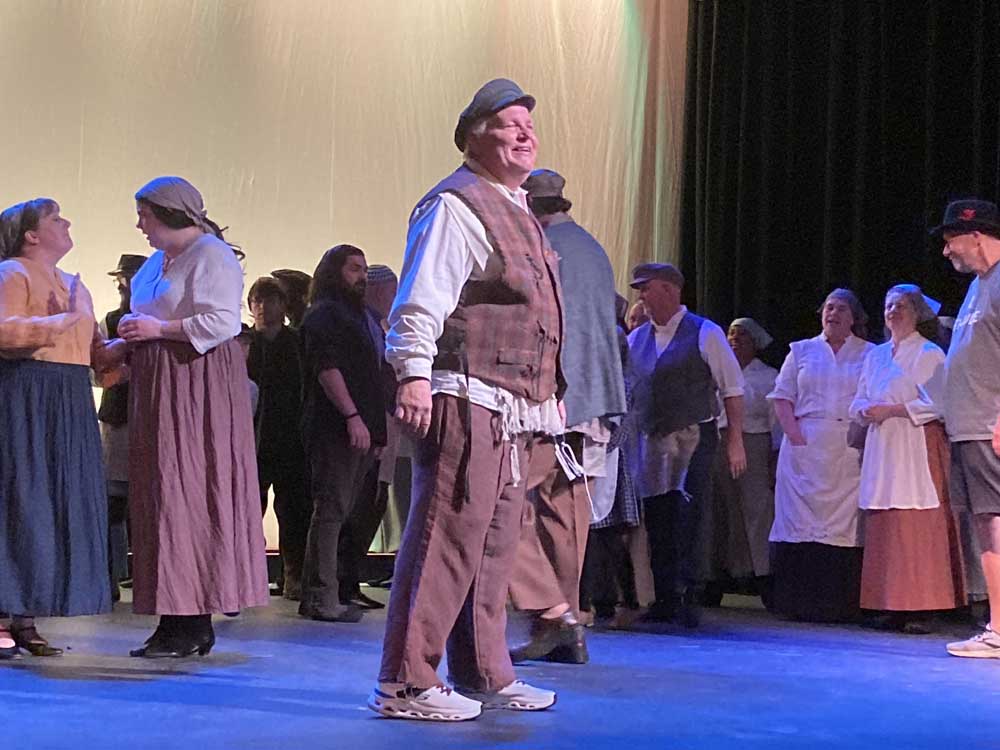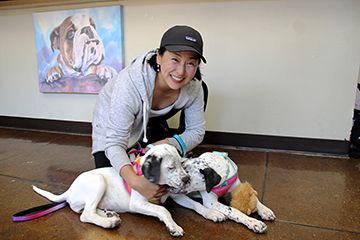‘Fiddler on the Roof’ at Pollard Theatre — a story of tradition, change, and family
Published 5:35 am Thursday, March 27, 2025

- Roger Pharr as Tevye in Fiddler on the Roof at Pollard Theatre Center. (Gini Rainey/Contributed Photo)
“A fiddler on the roof. Sounds crazy, no?”
Not really — at least, not if you’re familiar with the classic musical “Fiddler on the Roof.” For the cast and crew at Pollard Theatre Center in Tyler, the challenge isn’t about balancing on rooftops with stringed instruments, but about preserving the essence of this powerful narrative.
Trending
“We all know and love the story,” said director Amanda Spangler. “It breaks your heart, mends it together again, breaks it again, and mends it once more. We bring our own experiences, we create our characters based on what we know of them, we do our research, and we understand the core meaning of each scene and the entire show.”
Set in a small Jewish village in the early 20th century, “Fiddler on the Roof” follows Tevye, a poor milkman who struggles to maintain his family’s traditions while raising his five daughters — Tzeitel, Hodel, Chava, Shprintze and Bielke — with the story primarily focusing on the eldest three.
Roger Pharr, who plays Tevye, explains, “It’s about the traditions of the Jewish community in Anatevka. Tevye interacts with the audience, starting with a discussion about tradition. As the story unfolds, he has conversations with God and sometimes the audience about how traditions are clashing with the younger generation.”
Tevye’s life becomes complicated when his daughters challenge the tradition of arranged marriages. His oldest daughter, Tzeitel, defies him by choosing to marry a poor tailor, Motel, instead of the wealthy but elderly butcher Lazar Wolf, whom Tevye had selected for her. As the other two daughters follow suit, Tevye struggles to balance his faith, values, and desire for their happiness.
“This tension is an ongoing theme,” Pharr said. “Each generation believes the new ideas of the younger generation are terrible, but they forget that their own traditions were once considered new, too. Every generation tweaks tradition. That’s the heart of Tevye’s story — his clash with tradition and his desire for his daughters to be happy.”
Amid personal struggles, external forces — such as anti-Semitic violence, political unrest, and the threat of displacement — begin to threaten the village’s stability. These pressures mirror the current climate of division and societal upheaval, making “Fiddler on the Roof” deeply relevant today.
Trending
“I think it’s always been a good story for any time there is change,” Pharr said. “We have to look at what’s happening and put faces on it — faces of people who have been dispersed over the years because of political needs. We need to remember the faces and stories of those people.”
The first stage production of “Fiddler on the Roof” took place in September 1964 on Broadway and held the record of the longest-running Broadway musical for almost 10 years. It is based on a series of short stories by Sholem Aleichem. In 1971, it was made into a film adaptation and met with critical and commercial success, followed by numerous nominations and awards.
“This is a well-known musical,” said Bryan Michels, who is not only part of the ensemble but a member of the Pollard Theatre Center board. “There are many folks from that era who remember the songs quite well.”
The cast and crew spent time not only getting to know the show but also the deep culture of the Jewish community.
“Rabbi (Neal) Katz has been giving us a lot of input on how to do the prayers and how to do everything properly,” Michels said.
For the cast of “Fiddler on the Roof,” rehearsing is about more than memorizing lines. It’s about learning the customs, traditions and nuances of Jewish culture, ensuring the story feels as authentic as possible. This understanding helps the actors portray the characters with respect, giving life to the history and emotions at the heart of the show.
“You should always be up for learning about other cultures and how the world used to work so we may continue to grow as people and as a society,” Spangler said.
While “Fiddler on the Roof” is often poignant, it also offers humor and warmth.
“I don’t want to make it a serious show because there’s so much laughter,” Pharr said. “It’s a show about remembering the faces and stories of those who lived through change.”
When it comes to the most rewarding aspect of the show, Spangler beams at her cast and crew.
“We have both seasoned actors and brand new actors, all amazing and hard-working, and I can’t wait to show them off to everyone, (and) my crew is just as talented,” she said. “We have all been working diligently for the past few months to ensure we have the best musical possible, and I know audiences will love it.
Known for its unforgettable songs like “If I Were a Rich Man,” “Sunrise, Sunset,” and “Matchmaker,” “Fiddler on the Roof” explores the themes of family, faith, resilience, and the ongoing struggle for identity in the face of societal pressure.
“Traditions drive the people of this town and to follow your heart instead of your traditions is something that was not often done,” Spangler said. “I think the way we dive into this will really resonate with each audience and provide discussion afterwards on what they would do in these situations.”
The show runs from April 3-6 at Pollard Theatre Center, located at 3030 Copeland Rd. in Tyler. Tickets are $18, with performances Thursday and Friday at 7:30 p.m., Saturday at 2:30 p.m. and 7:30 p.m., and Sunday’s matinee at 2:30 p.m. Tickets can be purchased by calling 903-521-0069 or visiting www.cur8.com using the keyword “Pollard.”
“It is a carefully crafted work of art which is meant to be timeless in many ways,” Spangler said. “Beyond the storyline, the music is catchy and invigorating, and the vocals are beautifully haunting at times. There is so much to love about Fiddler on the Roof and it will continue to be loved and cherished for decades to come. We are thrilled to be part of its journey.”






